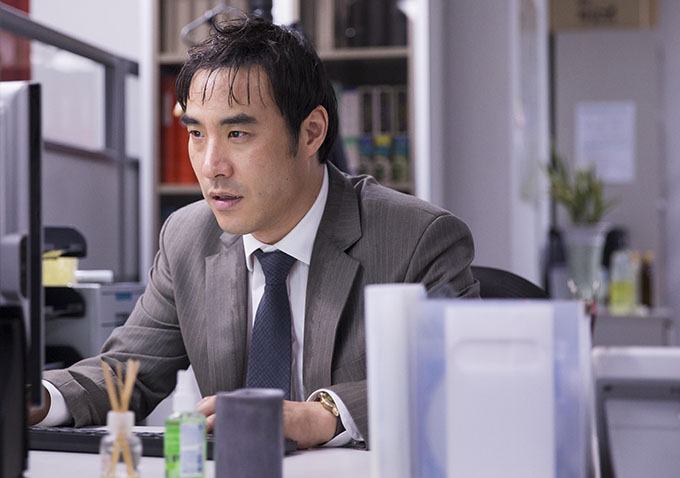 Anyone who’s been paying attention knows that for the last decade or so, some of the most exciting cinema, or just cinema period, has come out of South Korea. The nation’s produced, since the turn of the century, filmmakers like Park Chan-Wook, Bong Joon-Ho and Kim Jee-Woon, and films like "Sympathy For Mr. Vengeance," "Memories Of Murder" and "I Saw The Devil," to name but a few. Cannes has been a big part of introducing this Korean New Wave to the world, with "Oldboy" and "The Host" among those that screened here, and it was only last year that Jessica flipped for crackerjack thriller "A Hard Day." It’s become sort of a tradition that one of the midnight movie slots is filled with a Korean genre pic, and this year the honor has fallen to "Office," the directorial debut of Hong Won-Chan, who co-wrote Korean thriller hits "The Chaser" and "The Yellow Sea."
Anyone who’s been paying attention knows that for the last decade or so, some of the most exciting cinema, or just cinema period, has come out of South Korea. The nation’s produced, since the turn of the century, filmmakers like Park Chan-Wook, Bong Joon-Ho and Kim Jee-Woon, and films like "Sympathy For Mr. Vengeance," "Memories Of Murder" and "I Saw The Devil," to name but a few. Cannes has been a big part of introducing this Korean New Wave to the world, with "Oldboy" and "The Host" among those that screened here, and it was only last year that Jessica flipped for crackerjack thriller "A Hard Day." It’s become sort of a tradition that one of the midnight movie slots is filled with a Korean genre pic, and this year the honor has fallen to "Office," the directorial debut of Hong Won-Chan, who co-wrote Korean thriller hits "The Chaser" and "The Yellow Sea."
READ MORE: Essential Films From The South Korean New Wave.
Unconnected to either Ricky Gervais‘ baby or Johnnie To‘s upcoming musical, the film opens with a sequence that’s brutal even though it leaves almost everything to the imagination: Seoul salaryman Kim Byung-Guk (Bae Seong-Woo) returns home from work to his family, only to massacre every one of them, including his disabled son, with a hammer. The next day, when Detective Choi Jong-Hoon (Park Sung-Woon) brings the news to Kim’s colleagues on Sales Team No. 2, they’re all shocked, none more so than intern Lee Mirae (Ko A-Sung, from "The Host" and "Snowpiercer"), who was close to the man. But more concerning is the news that the killer is still at large, and was last seen on CCTV heading back to the office. Suspicion runs rife, particularly once the overworked, underpaid Lee realizes that her colleagues want her to tell the police as little as possible…

In his director’s statement, Hong writes that Korea has "a social system in which working is survival and dismissal is death," but this isn’t a culturally specific world that he’s looking at. In the recession era, overwork, corporate malevolence and internship culture are issues throughout the modern world. And the film is at its best when examining the social realities behind its set up. Hong has a keen eye for the office politics and dynamics that should be familiar to anyone that’s ever been part of the cubicle-and-commuter set. The various workmates, from stern Director Kim (Hong Sang-Soo veteran Kim Eui-Sung) to his ambitious deputy (Ryu Hyun-Kyung) are well-drawn and differentiated, and the sense of pressure, particularly on harassed intern Lee, is palpable.
The result is a genre picture with an unusual degree of substance behind it. The problem is that it doesn’t work at all as a genre picture. The plotting is mostly contrived and creaky—we’re faced with some of cinema’s dumbest detectives who only thinks to search the office building, despite suspecting that Kim has returned there, at the end of the film–with a half-hearted hint at something supernatural that’s never fully developed. There’s little tension or invention in the suspense sequences, and Hong’s direction is lacking in the flair of confidence of some of his contemporaries, with a rather flat visual style. Even gorehounds aren’t likely to be satisfied, and there’s something unpleasantly skewed about the way that only the female victims are dispatched on screen, with the male characters getting stabbed up once the camera cuts away.

It’s also kind of po-faced, taking a premise that could have benefited from a hefty dose of black comedy and satire, and playing it completely straight. It all culminates in a final twist that’s both heavily telegraphed, and somewhat nonsensical, leaving a muddled feel to the film’s wrap up. And it’s a shame, because Hong does so well at the ordinary character drama and interplay that you can glimpse something special that the film could’ve been. It’s unusual that we’d say this, given our love of Korean genre film, but perhaps the director could have better served the issues he wanted to examine by leaving out the horror altogether. [C]
Check out the rest of our coverage of the 2015 Cannes Film Festival by clicking here.


